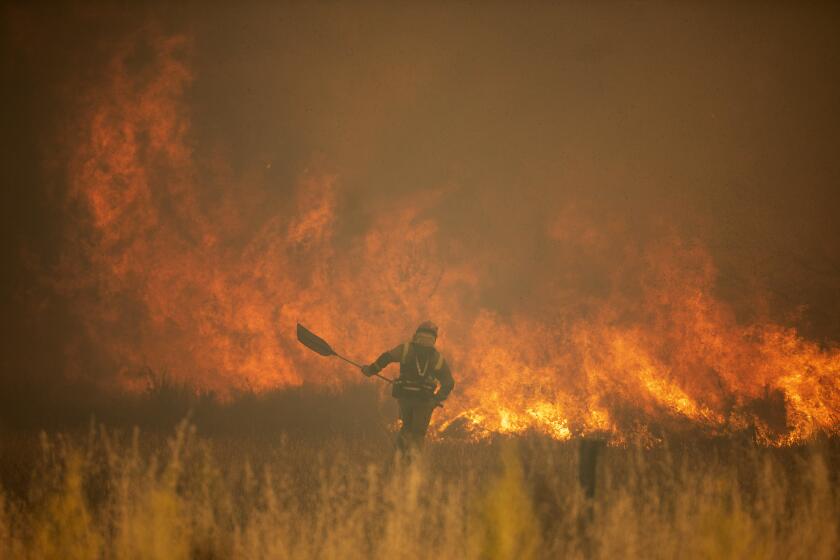Macron alliance projected to lose parliamentary majority in France

- Share via
PARIS — French President Emmanuel Macron’s centrist alliance was projected to lose its majority despite getting the most seats in the final round of the parliamentary election Sunday, while the far-right National Rally appeared to have made big gains.
The projections, which are based on partial results, show that Macron’s candidates will win between 230 and 250 seats — far fewer than the 289 required for a straight majority in the National Assembly, France’s most powerful house of parliament.
A new coalition — made up of the hard left, the Socialists and the Greens — is projected to become the main opposition force, with 140 to 160 seats.
Firefighters in Spain and Germany are struggling to contain wildfires amid an early heat wave in Western Europe.
National Rally is projected to register a huge surge, with potentially more than 80 seats, up from eight before the election. Polling was held nationwide to select the 577 members of the National Assembly.
The strong performance of both the National Rally and the leftist coalition, led by Jean-Luc Mélenchon, is expected to make it harder for Macron to implement the agenda on which he was reelected in May, including tax cuts and raising France’s retirement age from 62 to 65.
The National Rally’s leader, Marine Le Pen, who lost the presidential election to Macron, was reelected in her stronghold of Hénin-Beaumont in northern France.
“The Macron adventure has reached its end,” Le Pen said. The group of National Rally lawmakers “will be by far the biggest of the history of our political family.”
Acting National Rally president Jordan Bardella compared his party’s showing to a “tsunami.”
“Tonight’s message is that the French people made from Emmanuel Macron a minority president,” he said on TF1 television.
Mélenchon described the vote as “the electoral failure of Macronism.”
Macron’s government will still have the ability to rule, but only by bargaining with legislators. The centrists could try to negotiate on a case-by-case basis with lawmakers from the center-left and from the conservative party — with the goal of preventing opposition lawmakers from having enough numbers to reject the measures.
The government could also occasionally use a special measure provided by the French Constitution to adopt a law without a vote.
“We’ve known better evenings,” government spokesperson Olivia Grégoire said on France 2 television. “This is a disappointing top position, but still a top position.
“We are holding out a helping hand to all those who are OK to make that country move forward,” she added, referring to the Republican Party, which is expected to have fewer seats than the far right.
Interior Minister Gérald Darmanin, who won a seat in his district in northern France, stressed that Mélenchon “lost his bet” to win the election. Prime Minister Elisabeth Borne also won a seat, in western France.
A similar situation occurred in 1988 under Socialist President Francois Mitterrand, who had to seek support from the Communists or centrists to pass laws.
These parliamentary elections have once again largely been defined by voter apathy — with more than half the electorate sitting them out.
Audrey Paillet, 19, who cast her ballot in Boussy-Saint-Antoine in southeastern Paris, was saddened that so few people turned out.
“Some people have fought to vote. It is too bad that most of the young people don’t do that,” she said.
Macron made a choreographed plea to voters last week from the tarmac ahead of a trip to Romania and Ukraine, warning that an inconclusive election, or hung parliament, would put the nation in danger.
“In these troubled times, the choice you’ll make this Sunday is more crucial than ever,” he said Tuesday, with the presidential plane waiting in the background ahead of a visit to French troops. “Nothing would be worse than adding French disorder to the world’s disorder,” he said.
Some voters agreed, opting against choosing candidates on the political extremes who have been gaining popularity. Others argued that the French system should give more voice to the multifaceted parliament and place more checks on the president, who has broad power.
“I’m not afraid to have a National Assembly that’s more split up among different parties. I’m hoping for a regime that’s more parliamentarian and less presidential, like you can have in other countries,” said Simon Nouis, an engineer who voted in southern Paris.
“The disappointment was clear on the night of the first round for the presidential party leaders,” said Martin Quencez, political analyst at the German Marshall Fund of the United States.
Macron’s failure to get a majority could have ramifications across Europe. Analysts predict that the French leader will have to spend the rest of his term focusing more on his domestic agenda than on foreign policy, perhaps spelling the end of President Macron, the continental statesman.
More to Read
Sign up for Essential California
The most important California stories and recommendations in your inbox every morning.
You may occasionally receive promotional content from the Los Angeles Times.














